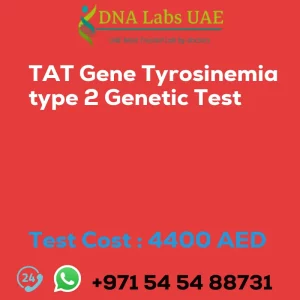ABCA3 Gene Surfactant Metabolism Dysfunction Type 3 Genetic Test
At DNA Labs UAE, we offer the ABCA3 Gene Surfactant Metabolism Dysfunction Type 3 Genetic Test to help diagnose and understand this rare genetic disorder. This test is specifically designed to analyze mutations in the ABCA3 gene, which is responsible for producing a protein involved in the metabolism and transport of surfactant in the lungs.
Test Components and Cost
The ABCA3 Gene Surfactant Metabolism Dysfunction Type 3 Genetic Test is priced at 4400.0 AED. The test requires a blood sample for analysis and the results are typically delivered within 3 to 4 weeks. We use NGS (Next-Generation Sequencing) technology for this test, allowing for the simultaneous analysis of multiple genes or even the entire genome.
Symptoms and Diagnosis
Surfactant metabolism dysfunction type 3 (SMDP3) is a rare genetic disorder that affects the production and function of surfactant in the lungs. This condition leads to respiratory distress and lung disease, usually starting in infancy. If you suspect SMDP3 based on clinical symptoms and other diagnostic tests, our ABCA3 Gene Surfactant Metabolism Dysfunction Type 3 Genetic Test can help confirm the diagnosis.
How the Test Works
Our genetic test involves collecting a sample of DNA, typically through a blood or saliva sample, and analyzing it for mutations in the ABCA3 gene. This test utilizes NGS technology, which allows for the rapid sequencing of large amounts of DNA. By analyzing the DNA for mutations in the ABCA3 gene, we can determine if surfactant metabolism dysfunction type 3 is present.
Importance of Genetic Counseling
Before and after undergoing the ABCA3 Gene Surfactant Metabolism Dysfunction Type 3 Genetic Test, it is highly recommended to seek genetic counseling. Genetic counseling can provide individuals and families with a better understanding of the implications of the test results and help them make informed decisions. Our genetic counselors can also assist in drawing a pedigree chart to identify other family members who may be affected by SMDP3.
If you suspect surfactant metabolism dysfunction type 3 and would like to undergo genetic testing, please consult with a general physician who can refer you to our Genetics Department for the ABCA3 Gene Surfactant Metabolism Dysfunction Type 3 Genetic Test. At DNA Labs UAE, we are committed to providing accurate and reliable genetic testing services to aid in the diagnosis and management of genetic disorders.
| Test Name | ABCA3 Gene Surfactant metabolism dysfunction type 3 Genetic Test |
|---|---|
| Components | |
| Price | 4400.0 AED |
| Sample Condition | Blood |
| Report Delivery | 3 to 4 Weeks |
| Method | NGS Technology |
| Test type | Metabolic Disorders |
| Doctor | General Physician |
| Test Department: | Genetics |
| Pre Test Information | Clinical History of Patient who is going for ABCA3 Gene Surfactant metabolism dysfunction type 3 NGS Genetic DNA Test A Genetic Counselling session to draw a pedigree chart of family members affected with Surfactant metabolism dysfunction type 3 |
| Test Details |
The ABCA3 gene is responsible for producing a protein called ATP-binding cassette subfamily A member 3, which is involved in the metabolism and transport of surfactant in the lungs. Surfactant is a substance that helps to reduce surface tension in the alveoli, allowing for efficient gas exchange. Surfactant metabolism dysfunction type 3 (SMDP3) is a rare genetic disorder caused by mutations in the ABCA3 gene. This condition leads to abnormal surfactant production and function, resulting in respiratory distress and lung disease, typically starting in infancy. NGS (Next-Generation Sequencing) genetic testing is a type of genetic testing that allows for the simultaneous analysis of multiple genes or even the entire genome. It uses high-throughput sequencing technologies to rapidly sequence large amounts of DNA. An NGS genetic test for ABCA3 gene mutations can be used to diagnose surfactant metabolism dysfunction type 3. This test involves collecting a sample of DNA, usually through a blood or saliva sample, and analyzing it for mutations in the ABCA3 gene. The results of the test can help confirm a diagnosis and guide treatment decisions. It is important to note that genetic testing for surfactant metabolism dysfunction type 3 is typically only done when there is a strong suspicion of the condition based on clinical symptoms and other diagnostic tests. Genetic counseling is recommended before and after testing to help individuals and families understand the implications of the test results and make informed decisions. |








